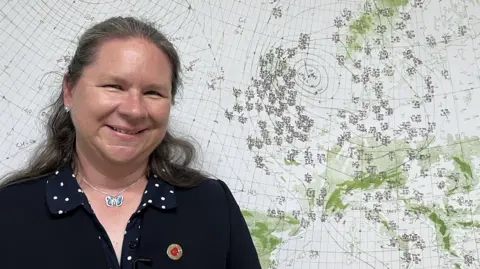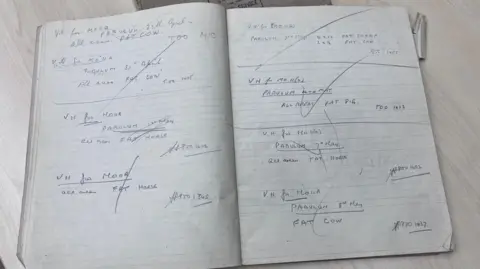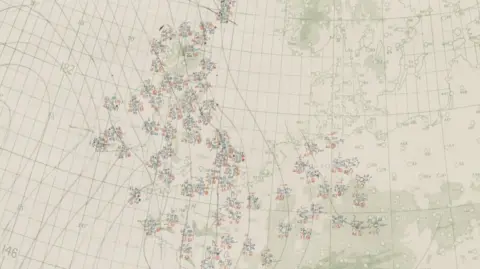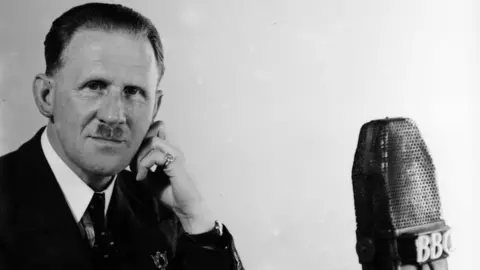Why weather forecasts returned on VE Day
 BBC
BBCWith the outbreak of World War Two in 1939, daily weather forecasts, which had been broadcast on the BBC since 1923, had to stop.
The forecasts put together by the Met Office became top secret information, as the weather played a crucial part in military planning.
However, the weather was still hugely important on the home front. For example, farmers needed to know when to protect crops from frost, so coded forecasts were shared through the civil defence network to those who needed to know.
It was not until the end of the midnight news on the BBC on VE Day, Tuesday 8 May 1945, that the general public heard the weather forecast again for the first time in six years.

Dr Catherine Ross, library and archive manager at the Met Office, said: "It was critical for the vast majority of military activities and within the Allied circles there was lots of coded forecasting going on."
Outside of the military, work also went on to share the forecast along the home front too.
"Within fuel, transport and farming, forecasts were still very important and so the Met Office produced special coded forecasts which were then distributed through the civil defence network."
 Met Office
Met OfficeThe notebooks of the "pabulum" forecasts - a code for the agricultural forecasts - show a series of words used, including dog, sheep, cow and pig, to specify the conditions such as fair or rain.
"Buy" was the code for good weather the following day, "sell" for bad weather and "fat" if there was uncertainty in the outlook.
Dr Ross said: "The forecast for VE Day was in code, as we were still at war at the point they were writing that forecast, and we have 'fat cow', which means rain in the morning, improving in the afternoon and uncertain after that."
'Tailpiece to victory news'
It was at the end of the midnight BBC radio news that the general public were then able to hear the weather forecast again for the first time since 1939.
Read by radio presenter Stuart Hibberd, he said: "As a tailpiece to victory day news, we give you tonight's weather forecast: the first you've heard since the war began."
He then went on to share the forecast for "sporadic rain" with "thunderstorms and bright intervals in places".
Mr Hibberd also made a light-hearted reference to "a long lost friend" – a depression, or area of low pressure, which has turned up again between Ireland and the Azores - which was why the outlook was unsettled.

The forecast notebooks from the Met Office archive also reflected the change as, from 9 May 1945, they were no longer written in code from then.
Remembering those who worked to gather the forecast information during the war, Dr Ross highlighted the challenges they faced working in code, but also how it was "critical".
She said: "It mattered to the military. It mattered to civil defence. It mattered to keeping the population fed and warm and moving.
"It really was critical to the war."
Follow BBC Devon on X, Facebook and Instagram. Send your story ideas to [email protected].
